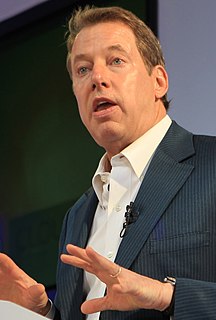A Quote by Eric Ries
There was a study done in the early 20th century of all the entrepreneurs who entered the automobile industry around the same time as Henry Ford; there were something like 500 automotive companies that got funded, had the internal combustion engine, had the technology, and had the vision. Sixty percent of them folded within a couple of years.
Related Quotes
In the 20th century, we had a century where at the beginning of the century, most of the world was agricultural and industry was very primitive. At the end of that century, we had men in orbit, we had been to the moon, we had people with cell phones and colour televisions and the Internet and amazing medical technology of all kinds.
Everybody thinks an automobile needs an engine. Well, an automobile doesn't necessarily need an engine. What we do is shift electric motors into the wheels of our automobiles and so we have a completely different kind of thing where we have four independent intelligent wheels rather than a traditional internal combustion engine and power train and so on.
I got to college in '99, and I went to study literature and writing, and so within a couple years we had Bush elected, 9/11, we were at war, so I was sort of having my political and spiritual awakening at the same time I was becoming an adult, and that's a lot of stuff at once. I became very focused on the state of the world, and I started studying that stuff more, and I just had a real identity crisis. I couldn't even really just study literature.
It's so easy to demagogue the issue and make someone who speaks out against the internal-combustion engine sound like an insane communist, when the truth is that the internal-combustion engine is the biggest threat to my life in the next 25 years, in terms of what it's doing to our environment and how it's depleting the ozone layer and so forth.
In every phase of the automotive industry, certain factors have been more important than all others in relation to the way the automobile has looked. Phase One is really the Ford story. Function and production were the most important considerations. The automobile was an invention, and it looked like one.
AMD's history is we've always had great technology. We've had periods of time where we've done really, really well, and we've had periods of time where we've done not so well. But most of the time we've done well, it's because we've had a leadership product or some technology where we were out in front before anybody else.
While greenies and their media flunkies continue to savage the gasoline-powered internal-combustion engine and rhapsodize about hybrids, hydrogen, electrics, natural gas, propane, nuclear, and God-knows-what-other panaceas, perhaps including bovine urine, there are no realistic, economically viable alternatives. None. Zero. Like it or not, as long as we remain dependent on the private automobile for transportation (roughly 80 percent of all movement in the nation is by car), we are harnessed to the IC gas engine.
Blasts from the past were like the rooms one entered and re-entered in dreams: they would not stay nailed down. When you returned to them, they had changed - they suddenly had more space or a tilt or a door that had not been there before. New people were milling around, the floors undulated, and the sun shone newly, strangely in the windows, or through the now blasted-open ceiling, or else it shone not at all, as if having fled the sky.
We had the great depression, we had two world wars, we had the flu epidemic. We had oil shock. We had all these terrible things happen. But something about the American system unleashed more and of a potential to human beings over that hundred years so that we had a seven for one improvement in - there's never been any - I mean, you have centuries where if you've got a 1 percent improvement, then it's something. So we've got a great system. And we've got more productive capacity now than we ever have.
There were a lot of races I was going to win at Milwaukee, but I had mechanical problems or something would happen, ... In the early years, it just took a long time for me to win a race. I got in somebody's oil one time and got in the wall, had a clutch go out once. . . so when I finally won one, it was a long time coming.



































